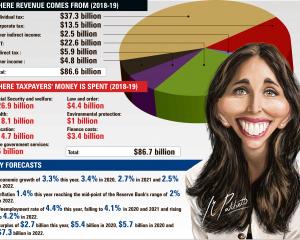The Government has released its first Budget, calling it the foundations for the future.
Prime Minister Jacinda Ardern said in Parliament this afternoon the Budget would build a better future for New Zealand children. There were major investments in health, education, housing and justice to improve the lives of thousands of children.
Finance Minister Grant Robertson is the beneficiary of a strong economy, forecasting increased surpluses at the same time as increasing spending substantially on health, education and housing.
Funding has been allowed for the rebuild of Dunedin Hospital but there are also increased funding for free doctors' visits and prescriptions to about 56,000 newly-eligible children.
Reaction has been relatively supportive to the Budget.
Deloitte partner Thorsten Engel said the extra capital spending for health announced in Budget 2018 was a start in tackling needed hospital maintenance and asset replenishment costs.
Officials would be well advised to heed lessons learned from how poorly past hospital design and construction projects have fared, and hopefully ensure better value for money was achieved this time around.
BusinessNZ chief executive Kirk Hope said some of the big ticket items in the Budget would help support business growth.
"An investment of $28 billion over 10 years in Auckland transport will improve infrastructure in our largest city, helping support the ability of business to grow and employ more.''
Large investments, in the Provincial Growth Fund and the Green Investment Fund, would also support the ability of businesses to grow and innovate using new technologies, he said.
The establishment of an R&D tax credit would boost the support available to businesses that need to invest in innovation to become more competitive.
Economist Cameron Bagrie said Budget 2018 showed a strong commitment to fiscal responsibility as was expected.
"The New Zealand economy has good momentum but I do ponder how easy it will be for the economy and resources to transition.''
Beyond the direct hit the agriculture and non-renewable sectors were taking, the economy had historically had big impetus provided by rising housing and land prices which had fuelled spending.













